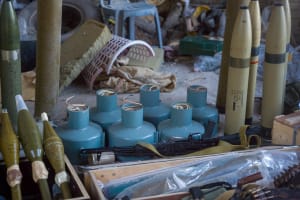Whose side of the Israeli political struggle are you on?

While recently engaged in a conversation with a Christian woman who lives in Israel, she mentioned she did not feel compelled to take sides in the political struggle happening here. Although she’d been aware of the Interior Ministry’s decision to no longer renew clergy visas for Christian workers in Israel, she apparently had not understood that this move is very much supported by the extreme ultra-Orthodox political parties who comprise the present government coalition.
It also wasn’t clear to her that a large part of the weekly protesters are not leftists, as often reported by most media outlets that have a biased interest in splitting the country into two groups – the political left and right. However, nothing could be further from the truth as it relates to much of the population who is against the proposed reforms.
In fact, in a recent article entitled, “Israel is in danger from a radicalized center,” Yedidia Stern, the writer says that, until the beginning of this year, “Israel’s political center had been hibernating, but in the past months, it has been shaken awake.”
While he sees those developments as a threat to the country, the important focus is that he, a professor of law at Bar Ilan University, recognizes that the vast majority of protesters are not from the extreme left, as many outsiders are led to believe, but rather centrists who are deeply concerned about the unprecedented direction into which this radical coalition is taking the country.
Those who coalesce, each week, in massive groups, numbering hundreds of thousands, are parents, grandparents, neighbors, students, businesspeople and everyday citizens who, just a year ago, didn’t have to worry about new laws which are being introduced, designed to favor the religious minority. For them, their goal is to dramatically change the character of the country and conform them more to their image.
What they seem to have missed, however, is that not everyone who lives in Israel is Jewish, and not every Jewish Israeli wants to live a religious lifestyle. Those are personal choices that must be respected and not altered by force.
Here's the thing, though. It’s not exclusively a Jewish-Israeli problem, because if you live in Israel, what happens over the next few months will concern you in one way or another. If you are working in a Christian ministry and your visa is soon to expire, you will have no choice but to leave.
Conversely, if a ministry needs to hire Christian employees in order to continue their service, they will not be able to do so. The upshot of these decisions is likely to result in the shutting down of long-term ministries which have been able to freely operate in the country for years, without fear of discrimination or the threat of being told to go home.
One such ministry is the International Christian Embassy, located in Jerusalem. ICEJ was founded in 1980 by evangelical Christians who had a desire to express their support for the Jewish people and their homeland. Since that time, it has served as a beacon of light to the Christian world, educating them as to the importance of the Promised Land, both from a biblical point of view as well as a political one.
This global ministry annually celebrates the Feast of Tabernacles (Sukkot), attracting thousands of Christian tourists each year, who make this pilgrimage which they recognize as being one of the three feasts to which they are commanded (as the nations in Zechariah 14) to come to Jerusalem.
Of course, putting on such a lavish and spectacular event that attracts thousands, demands a great many workers throughout the year, because the coordination and arrangements require at least a year in advance. They are only one ministry, amid a sea of others, that would be adversely affected. In a world filled with growing anti-Semitism, maybe such a pro-Israel ministry is an asset, deserving to remain in the land which they, too, love and admire.
But why stop there? If Christian ministries are seen as a threat to the ultra-Orthodox, what about foreign students, many of whom adhere to other faiths? It would stand to reason that if a house cleaning is about to take place, by shutting the doors to anyone who, in their way of thinking, poses a threat, then anyone who is not Jewish or already a citizen is at risk of being thrown out of the country. Obviously, that could also impact foreign workers of all types, without whom we would be hard-pressed to manage from an agricultural point of view.
When you think about just how many people this could affect, a calculated and systematic expulsion of non-Jewish residents could reduce the country’s population by a pretty sizable amount. So, maybe choosing a side in this Israeli political struggle is an act that has caught up with those who, up until now, thought that they could remain neutral and not get into the fray.
While all the political facets involved may not necessarily be the battle of non-citizens, the issues over which the protesters are fighting are, most definitely, universal concerns that most fair-minded and justice-loving individuals would respect and aspire to live under in their own countries of origin.
Those matters include three healthy levels of government which are independent and democratic. It also includes the right to live as free citizens, who make their own autonomous decisions about life choices, so long as it is within the parameters of the law. It means that religious coercion is not tolerated nor are laws that mandate dress codes or discrimination against women.
Let’s not forget that every country relies upon the patriotic duty of its citizens, who must serve and defend it, in order to assure its survival and continuation. These are all essential principles that are the hallmarks of any free and democratic society which hopes to attract visitors, students and workers to live alongside us for however long they are here to complete their goals.
Shutting the doors to foreigners is a stain on any country which holds itself out to be a nation that values liberty and respects the differences of others.
Sadly, there is no choice. One must choose a side if they claim to care about human rights, dignity and freedom because, without regard for those basic principles, they will soon discover that their indifference, or lack of taking a stand, will have to be done in a different geographic location because no choice will likely end up being a choice for them.

A former Jerusalem elementary and middle-school principal who made Aliyah in 1993 and became a member of Kibbutz Reim but now lives in the center of the country with her husband. She is the author of Mistake-Proof Parenting, based on the principles from the book of Proverbs - available on Amazon.













